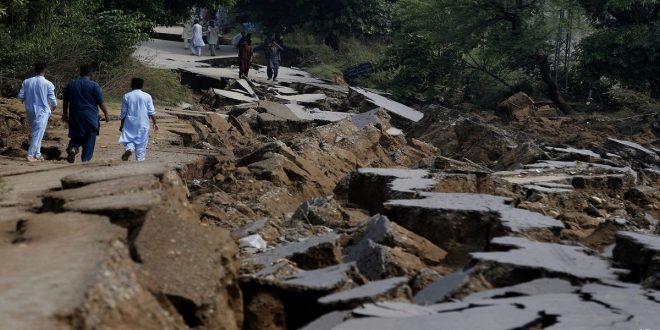It took the slow-moving wreckage of monsoon rains to become a full-fledged tragedy for the mainstream to take notice of. Yet, many would dismiss figures like over 35 million people displaced and millions of acres of agricultural land submerged as simply another Natural Disasters calamity.’
This is why those of us whose devotion to the metaphorical wretched of the Earth and natural ecosystems extends beyond the episodic must define the unnatural causes of the current floods and how to construct a meaningful long-term response.
Climate Change is Political:
First, the term “climate change” must be placed in a political-economic framework; nature is not just changing without human intervention. Since the beginning of the contemporary industrial order under Western capitalist powers, the Earth’s temperature has risen by 1.3 degrees Celsius. During the era of direct colonialism, we were the first losers of this system, and today we face the environmental consequences that high-carbon-emitting Western countries have externalized.
As a result, many people in Pakistan and abroad are pushing for climate reparations, decarbonization, and debt forgiveness. The floods’ tardy global attention has compelled the usual suspects in the international community to mobilize some relief funds. The state will cheerfully welcome whatever it can obtain, given the ridiculously euphoric mood with the release of the IMF tranche of $1.3 billion.
It is Critical to Work Collaboratively to Prioritize Preventive Measures
Debt is a primary tool used to discipline regimes like Pakistan on the global stage; goodwill gestures from purportedly generous donors are meaningless without a genuine engagement with the fundamental logic of the capitalist world order.
The domestic political economy of Pakistan is the other side of this equation; the hegemony of regional and global powers and MNCs precisely correlates to the voracious profiting of our own landed, industrial, commercial, and financial elites, as well as complicit state institutions.
Why are millions of Seraikis, Sindhis, Baloch, Gilgit-Baltistan, and others drowning only 12 years after the once-in-a-generation floods of 2010? Because successive governments, military officials, civil bureaucracy, ‘expert’ engineers, and the capitalist class have gone about their business, as usual, plundering Natural Disasters resources, recklessly encouraging real estate development and tourism, and constructing mega-development infrastructure.
Charity is Insufficient:
Many Pakistanis at home and abroad have contributed significantly to relief efforts on the ground. There are several stories of working-class people making cash contributions and performing heroic acts of rescue. One of the few collective features we may praise is the spirit of giving that animates people in our culture.
However, it is critical to recognize that the urgency of planetary survival necessitates more than charity. A lack of water will trigger longer-term ecological crises. Large parts of our semi-arid country are experiencing declining water tables. And many of the plain areas of Balochistan, Sindh, and the Seraiki Wasaib are currently inundate and may become unlivable in a few decades due to rising temperatures. While it is admirable to give what we can during difficult times, it is more necessary to band together to prioritize preventive action, as generosity will not avert environmental catastrophe.
Progressives Must Band Together:
This is all about politics. And only when a mass political consciousness emerges to inform mass political activity at home and abroad will things change. It is worth mentioning that most of the quickest responses to the floods came from peripheral progressive organizations and people who banded together to raise awareness of the issue and mobilize relief products and finances.
The issue of ecology has brought many progressives together worldwide, and it is arguably the one worry that can compel a significant political alliance to emerge across Pakistan’s unevenly developed and divided nation. After all, environmental ties between all of Pakistan’s ethnic groups are not optional; they exist, and there is a direct link between so-called “progress” in one region and its ecological consequences in another.





